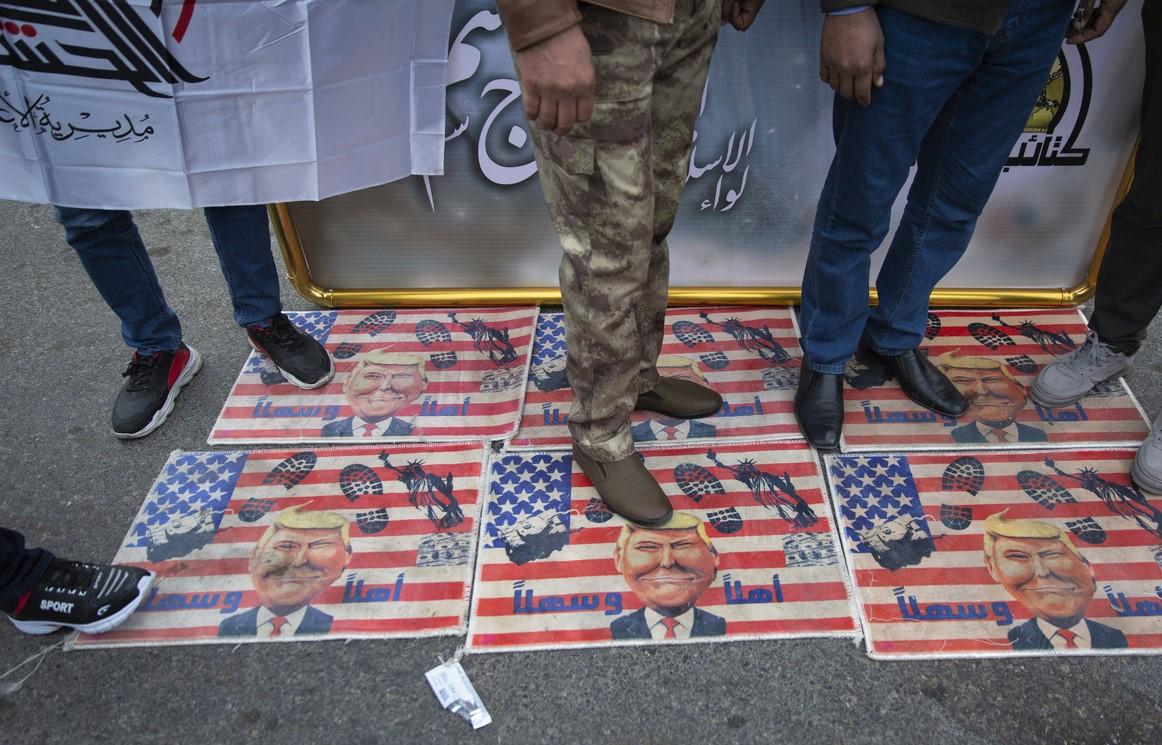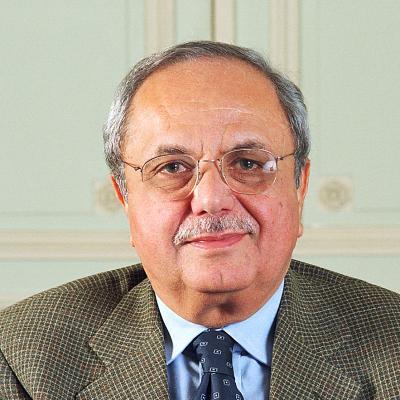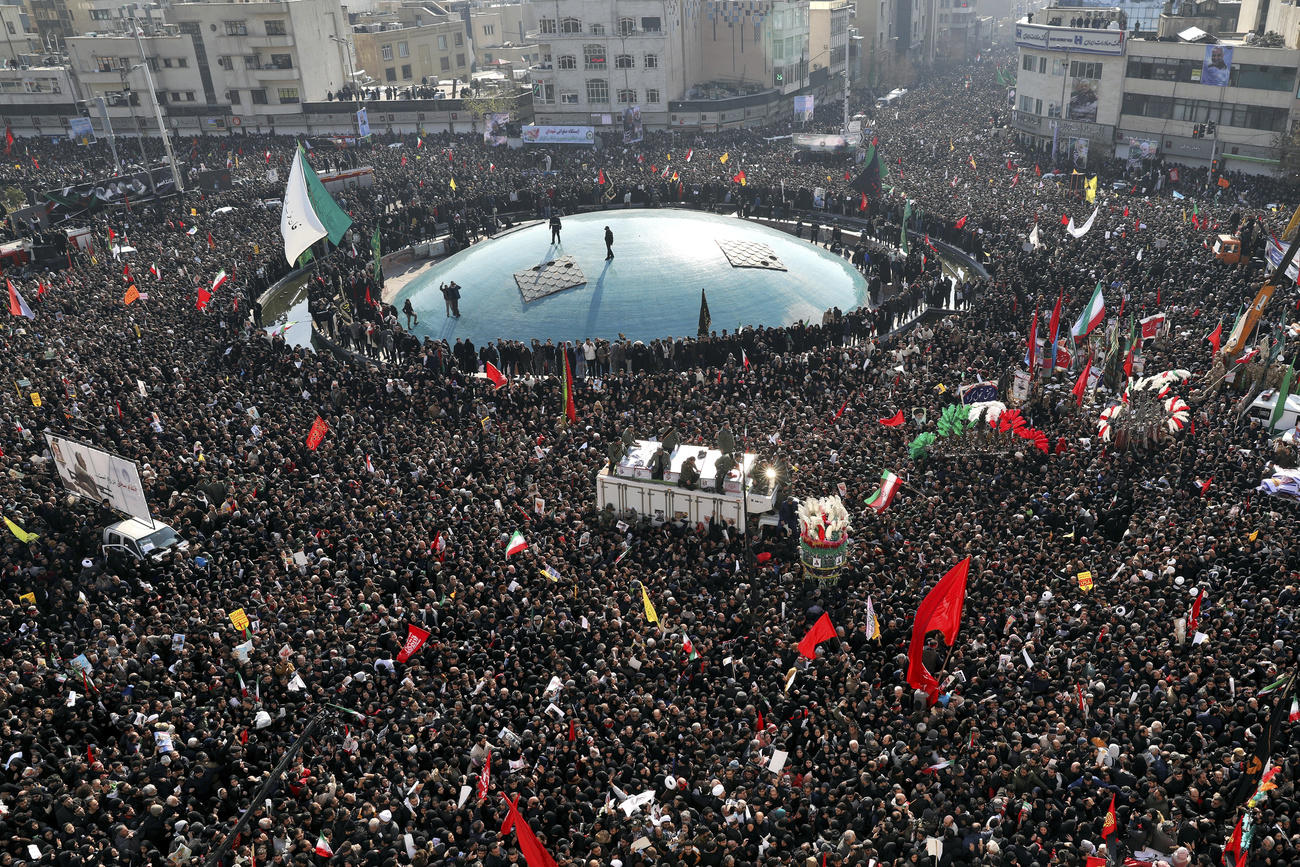
The Iranian paradox: a regional powerhouse but weak at home

The United States’ killing of Iranian commander Qassem Soleimani has not diminished Iran’s regional power, but internally the regime faces an impasse, according to a Geneva-based Iran expert.
On Wednesday, the US and Iran appeared to have backed away from the brink of further conflict in the Middle East. President Donald Trump signalled that the US would not respond militarily to Iran’s missile attacks on bases housing American troops in Iraq, an act of retaliation for the January 3 US drone strike that killed Soleimani.
Mohammad-Reza DjaliliExternal link, honorary professor of international relations at the Geneva Graduate Institute, gives his analysis of the current situation facing the Iranian regime and the wider Middle East due to the rising tensions.

swissinfo.ch: Iran’s supreme leader Ayatollah Ali Khamenei described the firing of more than a dozen missiles against Iraqi military bases hosting US-led coalition personnel as a “slap on the face” of the US. But he said such action was insufficient and that “the corrupt US presence in the region” should end. What’s your view on this statement?
Mohammad-Reza Djalili: This is the usual regime discourse, but the US is not leaving the region tomorrow.
swissinfo.ch: Iran Foreign Minister Mohammad Javad Zarif said the missile launches were a proportionate response and that Tehran was not seeking to escalate tensions or war with the US. Is that credible?
M.-R.D.: If you believe his words, we can say that this is not the start of a war and that, on the Iranian side, that’s where things remain for now. This is good news for the Iranian people, because if there was a major conflict with the United States, there would be many victims.
swissinfo.ch: The killing of Soleimani doesn’t seem to undermine Iran’s strategy of influence in the region, which was Washington’s justification for his death. What’s your view?
M.-R.D.: Soleimani’s death is extremely symbolic, as he had huge influence, and for years Iran has based its propaganda on his image – a serious general who won victory after victory. He has been replaced by his deputy, Esmail Ghaani, who knows very well the issues in the countries where the Revolutionary Guard forces are active. He shares the same network of contacts in Lebanon, Syria and Iraq; continuity therefore seems assured.
Ghaani’s power and influence will be as great as that of Soleimani, who answered directly to Khamenei, but he will have his own financial resources. Soleimani wasn’t just a general, he was Iran’s proconsul in the region, with political and military power. The Iranian ambassadors in Baghdad, Damascus and Beirut all come from the Revolutionary Guards. Ghaani will thus manage an essential part of Iran’s foreign policy that is outside the Iranian foreign ministry.

More
Is Iran’s nuclear deal dead?
swissinfo.ch: Does Ghaani have the stature and reputation to pursue this policy?
M.-R.D.: He gives that impression, as he has been fully aware of this policy, on a day-to-day basis. He was always at Soleimani’s side in the field and in touch with Iran’s partners and contacts in all these countries.
swissinfo.ch: Some experts warn that certain Iranian partners are not happy with the retaliation and may want to carry out their own attacks against Israel or Saudi Arabia, for example. Is that possible?
M.-R.D.: Until now, they have generally followed the orders of the Revolutionary Guards, whether in Lebanon, Syria or Iraq. But there is indeed a risk that some groups may act autonomously. But even if that happens, such actions will be limited in size. These “clients” are dependent on Iran for financial and military support.
swissinfo.ch: Meanwhile, in neighbouring Iraq there has been a major popular uprising denouncing Iran’s influence and the role played by Soleimani. How might these protests be affected by the US-Iran tensions?
M.-R.D.: Opposition to Iran’s presence in Iraq is deeply felt, not only among Sunnis, but also among Shiites. Perhaps the demonstrations will stop temporarily and resume later. The demonstrators want Iraq to become truly independent and to be able to take care of its own affairs without foreign interference.
That is what the text adopted by the Iraqi parliament after the elimination of Soleimani says. It calls for the withdrawal of foreign forces, not just American troops. This was to satisfy Iraqis who are hostile to Iran’s presence, as well as nationalist sentiments which were present during the Iran-Iraq war. Such feelings have not dissipated due to the numerous cases of interference by Iran, including their influence on the appointments of various Iraqi governments.
swissinfo.ch: Meanwhile, Iraq remains very fragile…
M.-R.D.: Since the American intervention in 2003, the American withdrawal under US President Obama in 2011 and the fight against the Islamic State in 2014, Iraq has been totally destabilised. No Iraqi government has managed to impose itself. Today, there is only an interim government which, in theory, is responsible only for day-to-day affairs.
swissinfo.ch: Tehran, which faces tough US sanctions, has been seriously weakened economically and also faces domestic protests. Do you see any changes ahead?
M.-R.D.: Iran’s internal situation is very worrying for the regime, since internal opposition continues. There is major popular discontent. The economic situation is becoming unmanageable. Iran is on the verge of bankruptcy, starting with its banking system.
The regime is unable to reform itself. It churns out the same slogans of 40 years ago, but the internal and international contexts have totally changed. The Iranian population has also changed; they are no longer the same people like at the beginning of the 1979 revolution.
The regime has a great capacity to organise demonstrations of support, but it remains blocked. It does not know how to respond to its citizens other than with brutal repression, like the protests two months ago. This is not a show strength, quite the contrary.

More
How ‘messenger’ Switzerland deals with the US and Iran
Translated from French by Simon Bradley

In compliance with the JTI standards
More: SWI swissinfo.ch certified by the Journalism Trust Initiative



























You can find an overview of ongoing debates with our journalists here . Please join us!
If you want to start a conversation about a topic raised in this article or want to report factual errors, email us at english@swissinfo.ch.